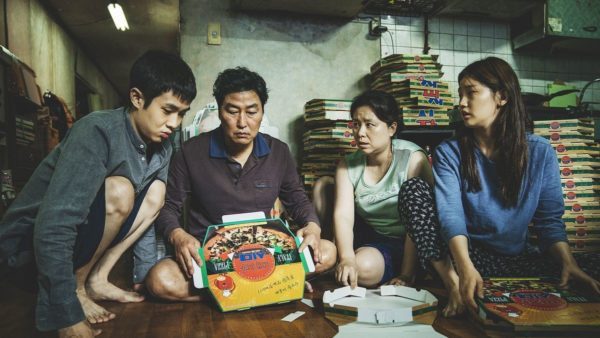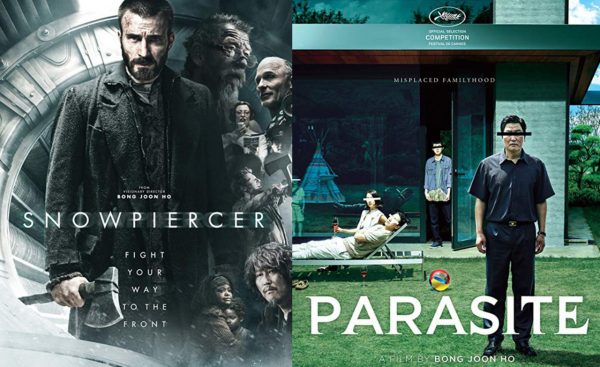In the first of new series of features, Tom Jolliffe suggests a class-themed double bill of Bong Joon Ho’s Parasite and Snowpiercer…
The beauty of cinema is how so many films can form a connective strand with others. Sometimes it can be a film-makers penchant for a similar message between a couple of films, or it can be marked similarities from entirely different properties, such as Fast and Furious and Point Break being effectively the same film.
It so happens for myself as a cinema fan I can watch a film, and fancy immediately following it without something it brings to mind. In the case of watching Bong Joon Ho’s Oscar winning and majestic thriller Parasite, my mind after also drifted to Snowpiercer and its crossover theme about class divides.
So beginning with what will be a recurring series of double bills, with varying levels of connection, lets look at Parasite and Snowpiercer.
Parasite:

Much has been said already, and undoubtedly will continue to, regarding Parasite. For me, this was a worthy winner at the Oscars. Bong Joon Ho’s masterfully weaved thriller was too good to overlook. It was too good not to be given a substantial release for Western Audiences. The fact this could win Best Picture, a film that people like to remind us, has subtitles, marks a significant cultural and creative victory for World Cinema. This is an important moment, and in a time where the major cinema chains are perpetually swamped with Marvel or Disney blockbusters, there’s a growing appetite with a growing minority of audiences, to need fresh and engaging material that isn’t bogged down in CGI or franchise canon specifics.
Ho’s film sees an unemployed lower class family slowly ingratiate themselves into the lives of an upper class family. Like most of Ho’s work, the film has a dark edge, some biting commentary, but with a satirical and nicely observed humour too. Part of the beauty of Parasite is it is not easy to fully define as a genre. It’s certainly a thriller, but it’s also dark enough at times to serve as horror and funny enough to serve as comedy. All identifiers aside, it’s exceptionally well written. Cinema in its most invigorating and surprising form (particularly if you go in not allowing yourself to read any spoilers). Definitely go in blind. The trailers are evocative but leave more than enough surprise.
The lower class are depicted as battlers, survivors, schemers. There’s an initial lack of empathy toward the wealthy, who are dismissed as stupid. Such is their constant need to pass on responsibility to someone lower than them, that their ability to properly function as responsible and self-reliant is gone. In Asia in fact, it’s not merely the very wealthy families who will have maids and nanny’s but the ever growing middle class. That’s not particularly made a point of here, but if the middle ground shows a need and reliance to pass some burdens to the hired help, then the upper class, extremely wealthy Park family have gone so far as hiring a housekeeper, a driver, an English teacher for their daughter and an art therapist for their troubled young son. The mother (Yeo-Jong Jo), with perfect skin and looking almost impossibly young for having a high schooling daughter, has reverted to almost adolescent levels of maturity. The answer to all is money. Pay someone to fix it. She can’t even load a dishwasher.
Whilst the lower class Kim family leave the window open in their basement apartment for free fumigation, steal wifi or look for opportunist moments to oust someone out of a job they can fill (like delivering Pizza), their schemes also seem to tell of a class (and I suppose every society has it) who want to live well, but in the easiest way possible. The son (Woo Sik-Choi) of the family has bigger aspirations to study and improve in that way, but is ultimately the one who puts into motion the beginnings of their infiltration of the Park’s. Likewise his sister, undoubtedly talented is also hindered by this inherent, ingrained desire to get ahead with minimal effort (undoubtedly slowly put upon them by their down and out father) . There-in lies the irony of the Kims. In instilling their scheme and maintaining their ruse, they go to increasingly great lengths. It’s the kind of forethought, effort and dedication to a ‘plan’ which if focused on genuine self-improvement, might have seen the family’s situation more honestly improve. Some times in the pursuit of laziness, great efforts are made and that irony is never seen by those. Still, it’s not just that black and white, with Padre Kim having a long and varied career as a hard working man that has still lead to being destitute (if working hard gets you nowhere, why make the effort?). His mindset has altered and his influence has been absorbed by his children.
Ho has great fun in depicting the great differences and the crossing similarities between the two families, and their overriding class identities too. On a visual level that divide is identified most succinctly by the Park’s sprawling post modern house at the top of a hill, far from the hustle and bustle of city centre life, whilst the Kim’s live in a squalid basement apartment below ground, where they street above is visited nightly by a vagrant drunk who looks to urinate near their window. The more into the plan the Kims get, the more they begin to feel that ingrained cultural snobbery and growing air of superiority the Parks have. It gets to a point the suggestion of being poor carries an unshakable stink, a thought that begins to infect Kim senior (Brilliantly played by Ho regular cohort, Kang-Ho Song).
Even when Mother Nature inflicts herself upon the helpless mortals below, the Parks, up high are safe from the kind of flooding and destruction the rich can recover from, whilst the rest below, in the depths of the City are ruined. Parasite, will bare repeat viewings very well, with plenty of nuggets undoubtedly left behind to pick upon. The subtlety in Oscar winning direction and Oscar winning script (both thoroughly deserving) cannot be underestimated. Laced with comedy and insight and satirical verve, Ho’s film beautifully and subtly (in comparison to say Joker) conveys the class divide that rings true, not merely in the Korean setting, but across every developed country.
Snowpiercer:

Whilst Parasite opted for a contemporary setting and underlying satire and cultural observation for its depiction of class, Snowpiercer is a little more overt. A post-apocalyptic Sci-Fi, with a very clearly laid out setting of a perpetually running train that homes the last of society, is as black and white a view on class as you can get. As is the case with most sci-fi that has a dystopian edge, we are clear. The back of the train, imbued with grime, dirt and over-populace sees a factory farm (almost) of near-slave workers, who keep the train mechanisms functioning, and the more upper class citizens, toward the front of the train, well looked after.
Being Sci-fi, revolution is required to propel the plot, and that is then lead (with initial reluctance) by Captain America…sorry, Chris Evans (as Curtis). Aided by Billy Elliot, sorry Jamie Bell (as Edgar), they set about hatching a scheme to work their way through the train compartments until they can gain control of the front, and begin something of a Corbin-esque socialist dream of sorts. Whilst it’s not quite as bravura as Parasite, Snowpiercer was a disappointingly overlooked film of 2013. There are certainly moments of social commentary that make the film prescient, whilst some of the third act twists open up some more interesting philosophical debates.

With strong visuals, great action and a stellar cast, Ho crafted a Sci-Fi film, in an era not exactly stuffed with engaging Scifi, that is worthy of repeat viewings. Chris Evans has rarely been better and the film offers more engaging dialogues than he ever got as Cap (the strongest of which was in Winter Soldier and parts of Civil War). John Hurt, Ed Harris and Tilda Swinton are as good as you would expect (which is to say never less than stellar) and Kang-Ho Song is, as he would later in Parasite (and well…just generally), is brimming with effortless charisma.
The interesting parallels and significant genre differences certainly make this double up well as a companion piece to Parasite. Interestingly, Ho has well balanced contemporary thrills and commentary, with genre films like Snowpiercer, Okja and Host (without ever negating a message or philosophical question at the heart of each picture).
Tom Jolliffe is an award winning screenwriter and passionate cinephile. He has a number of films out on DVD/VOD around the world and several releases due in 2020, including The Witches Of Amityville Academy (starring Emmy winner, Kira Reed Lorsch). Find more info at the best personal site you’ll ever see here.














